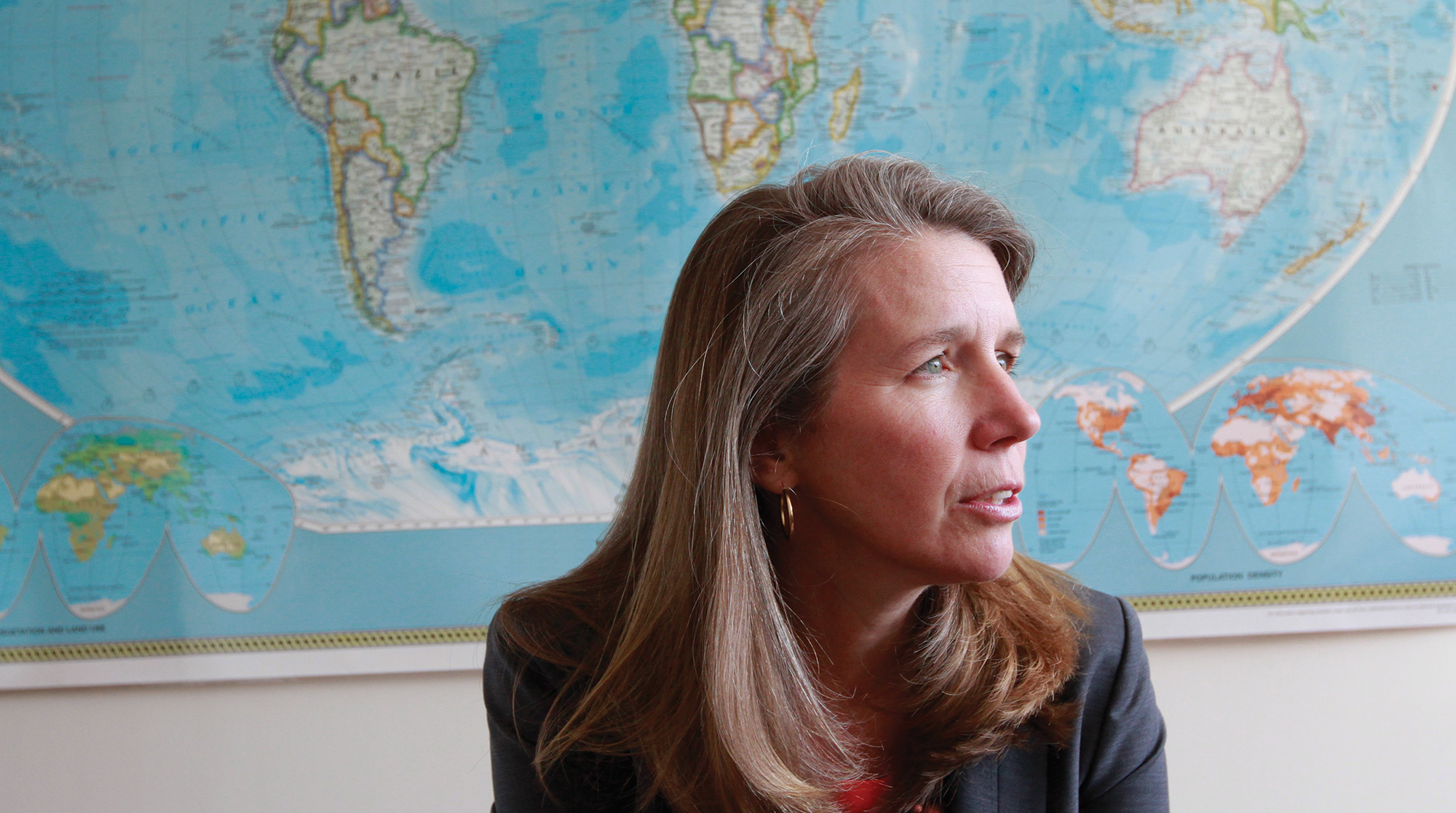

This article was originally published in September 2013.
At the forefront and frontier of those spreading the information revolution to developing countries stands an American nonprofit called Internews.
A few examples of its work:
Ask Internews’ CEO Jeanne Bourgault, ’86, ’90, a question about her work and the words come in a rush. After a dozen years on the job, Bourgault—a Seattle native who now lives in Maine—is still excited about what Internews does and is convinced that when it comes to economic and social progress abroad, as well as establishing democracy, the free flow of information itself can be a mighty force.
When the United States routed the Taliban after 9/11, Bourgault says Internews urged the international community to “invest in [building Afghani] media early. Get in there fast…get the media right and it will advance all the other work that you’re doing.”
She later saw what the free flow of information can do in Kenya, where Internews educated journalists that male circumcision was an important way to combat HIV/AIDS. Later, a study showed that Kenya’s rate of male circumcision was much higher than in other African countries and credited media coverage. The journalists, she said, made male circumcision “acceptable and [Kenyans] could talk about it openly,” and their stories led to lower HIV/AIDS rates. After meeting with the journalists, she said, “you see the pride in their faces. You see how powerful it is for them to have taken on this storytelling role and actually helping change their society.”
Under her guidance in the past decade, Internews has gone from a narrow concentration on building a thriving news media to seeking progress on many information fronts.
Headquartered in California, Internews has empowered local media for 31 years across the globe to provide often desperately poor or marginalized communities with the news and information they need, the ability to connect to the outside world and the means to make their voices heard. Radio towers, television facilities, social media and mobile communications are the tools of Internews’ trade. Media development to Internews encompasses both the news media and new media.
Internews is a big outfit: some 650 employees, most locals, in 56 countries and a budget of $60 million. Staff work in many areas of media development, such as increasing coverage of vital issues, expanding access to information, and advocating for reforms in media law and policy. Sometimes (witness Africa) they devise ingenious solutions to media problems. Internews’ work at the local level cuts deeply into major parts of society—the environment, humanitarian crises, women’s issues and health.
Bourgault is not a journalist. Still, her preparation for leading Internews—recruited in 2001, she became chief operating officer in 2005, president in 2011, and CEO last January—may have been ideal. As a “democracy officer” for the U.S. Agency for International Development in Moscow, she witnessed the Soviet Union’s abandonment of communism in the early 1990s. The Russians were fighting in Chechyna at the time, and Internews helped a few Russian media entrepreneurs start a television station. They were the first to film body bags coming out of Chechnya, film that most Russians eventually saw. The footage, says Bourgault, “brought the war home to people…and it really helped support the antiwar movement for the first time.” The episode impressed her with “the power of information and media to really change what’s happening in a country.”
A decade later, she was a private consultant in Serbia helping run programs supporting the opposition to Slobodan Milosevic’s authoritarian regime. “Even in the Balkans, I saw the power of the media,” she says, referring to Belgrade radio station B-92’s role in overthrowing Milosevic.
Bourgault had worked in these countries with everyone from residents trying to create a park to girls seeking an education. She brought to Internews a strong sense of community dynamics, rather than the usual journalistic orientation. Part of this is her ability to see things not as an outsider, but from the perspective of the local community.
Under her guidance in the past decade, Internews has gone from a narrow concentration on building a thriving news media to seeking progress on many information fronts. For example, Internews now provides people information to cope with humanitarian crises, whether the product of flood, warfare or other cause. They can readily learn where to find safe water, which schools are open, and where the border can be crossed safely.
Internews staff and outsiders praise Bourgault for doing what she says, listening to everyone, and being open to conflicting views. They also cite her ability to turn ideas into programs and make hard decisions and for caring about her employees, who, in turn, “have an enormous sense of loyalty to her.”
Bourgault is used to being on the go. Though she lives and works in coastal Maine with her husband Ray Jennings and their two daughters—5 and 9 years old, adopted from China—she commutes to Internews’ office in Washington, D.C., once or twice a month. She also travels abroad regularly. Jennings, a consultant who also does international development work, travels even more than she does.
“We tag team parent a lot”, says Bourgault. “One of us is always home [with the girls] with plenty of overlap. I’m…on the road every other week.” Still, she manages to be home most weekends.
Bourgault’s husband marvels at how efficiently she divides her time. “When she’s not working, she unplugs, “ he says. “She’s not somebody who’s always checking her smart phone. She’s, I think, better than almost anybody I know at making sure she’s present.”